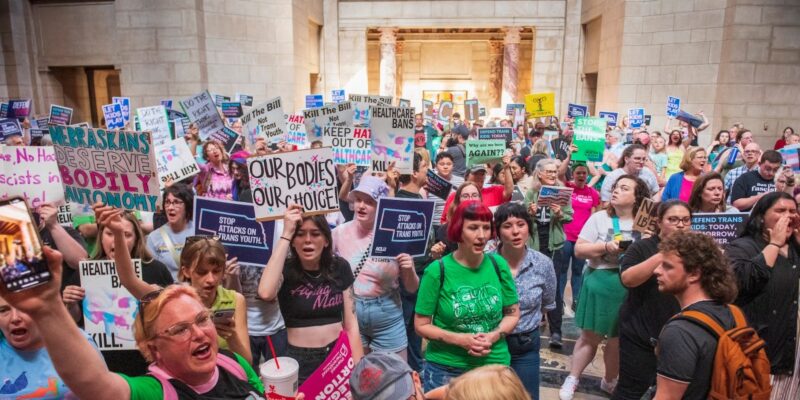
More than two years since the overturn of Roe v Wade, legal battles over abortion laws are as chaotic as ever. But occasionally, the challenges playing out state by state result in a string of good news for abortion rights. That was the case this week, with a cluster of court decisions that will expand abortion access in Nevada and North Dakota, and allow Missouri and Nebraska voters to weigh in on the issue in November.
On Thursday, District Court Judge Bruce Romanick in Bismarck, North Dakota, issued a powerful opinion siding with abortion providers who challenged a state law that had deemed their practice a felony.
In his order, which takes effect in two weeks, Rominick ruled that the North Dakota constitution’s protections for life, liberty, and the right to pursue happiness include the right to choose abortion. “A woman’s choice of whether or not to carry a pregnancy to term shapes the very nature and future course of her life, on nearly every possible level,” he wrote. “The Court finds that such a choice, at least pre-viability, must belong to the individual woman and not to the government.” He also struck down the ban for its vagueness, concluding that, at present, North Dakota doctors could be prosecuted if other physicians second-guessed their decision to provide an emergency abortion.
Virtually all abortions have been illegal in North Dakota since April 2023, when Republican Gov. Doug Burgum signed a ban with exceptions only to save the life of the pregnant person, or for rape and incest survivors within the first six weeks of pregnancy. North Dakota’s only abortion clinic moved across the state line to Minnesota in 2022, soon after the Supreme Court overturned Roe v. Wade, meaning most people seeking to end a pregnancy will have to leave the state.
But Romnick’s decision should make it easier for doctors to provide emergency abortions to patients with severe pregnancy complications—care that that is often withheld in abortion-ban states, with dire consequences. “It is now much safer to be pregnant in North Dakota,” Center for Reproductive Rights lawyer Meetra Mehdizadeh said in a statement on Friday.
Also on Thursday, a Nevada court order requiring the state Medicaid program to cover abortion became final after the state government declined to appeal an earlier ruling. Nevada will become the 18th state to allow Medicaid funds to cover abortion, the Associated Press reported.
That ruling is the result of a challenge brought under Nevada’s Equal Rights Amendment, which added language banning sex discrimination, along with many other types of discrimination, to the state constitution. Voters there supported the ERA by a nearly 18-point margin in 2022.
In their lawsuit, a Nevada abortion fund and the ACLU argued that the ban on Medicaid coverage amounted to sex discrimination because it denied low-income Nevadans who can become pregnant the ability to make decisions about their future. Back in March, a Clark County District Judge Erika Ballou had agreed—though her decision didn’t become final until this week.
”There was a time when we got it wrong and when women did not have a voice,” one judge wrote. “This does not need to continue for all time.”
“The court made clear that the state cannot withhold coverage for essential, sex-linked health care from low-income Nevadans,” ACLU Reproductive Freedom Project staff attorney Rebecca Chan explained in a statement. “As a result of this decision, Nevadans who have Medicaid as their health insurance will no longer need to fear that they will be forced to carry a pregnancy against their will.”
In November, voters in New York will decide whether to enshrine an ERA of their own—one of 10 states with abortion-related initiatives slated for the 2024 ballot. Yet initiatives in two of those states were in jeopardy until courts came to their rescue this week. On Tuesday, the Missouri Supreme Court threw out a last-minute claim arguing that the text of an abortion-rights initiative petition had omitted details required by state law; it ordered the anti-abortion secretary of state to certify the initiative for the ballot.
On Friday, the Nebraska Supreme Court ruled that dueling initiatives can appear on the ballot in that state, where current law bans abortion after 12 weeks. One of the initiatives, titled “Protect the Right to Abortion,” would create a state constitutional right for Nebraskans to get an abortion prior to “viability” (the hard-to-pinpoint moment in pregnancy when a fetus is able to survive outside the uterus). The other, titled “Protect Women and Children” would enshrine the current 12-week abortion ban in the state constitution.
If both pass, the one with the most votes prevails. But anti-abortion advocates had tried to kill the pro-abortion rights measure altogether by arguing that by regulating abortion before and after viability differently, it dealt with more than one subject, according to the Nebraska Examiner. Friday’s state Supreme Court ruling tossed that challenge, and ensures the vote on both questions will proceed.
Now, with 52 days left before voters will decide whether to add abortion protections to their state constitutions, the opinion from North Dakota’s Judge Rominick could offer some guidance.
“If we can learn anything from examining the history and prior traditions surrounding women’s rights, women’s health, and abortion in North Dakota, the Court hopes that we would learn this: that there was a time when we got it wrong and when women did not have a voice,” Rominick wrote. “This does not need to continue for all time, and the sentiments of the past, alone, need not rule the present for all time.”















